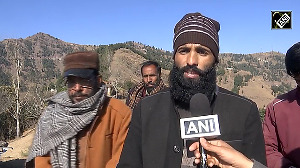'The Emergency was a temporary affair. It was withdrawn after 20 months.'
'But we are in this situation for the last 10 years.'
'If the Emergency was jhatka, this is halal, slow killing.'

Last month, the Narendra D Modi government decided to amend the All India Services (Death-cum-Retirement Benefits) Rules, 1958, giving it more power to withhold or withdraw the pension of retired Indian Administrative Service (IAS), Indian Police Service (IPS) and Indian Forest Service (IFoS) officers.
After the amendment, the central government can take action against an officer without a reference from the state government.
In no time, 94 former bureaucrats from the Constitutional Conduct Group who have been questioning the government's policies through open letters, once again signed a public statement urging the government to scrap the amendment.
M G Devasahayam, a retired IAS officer from the 1968 batch and one of the senior-most retired civil servants in the country, is one of the signatories of the public statement.
Before joining the IAS, Mr Devasahayam was commissioned in the Indian Army in 1964 and had participated in the 1965 War and counter-insurgency operations in Nagaland in 1967-1968.
"Even during the Emergency, these kind of threats were not there. Now, the only instrument they have is to put fear in the minds of everybody's mind; that of the media, academia, bureaucrats," Mr Devasahayam tells Rediff.com's Shobha Warrier.
You have been a signatory of the letters drafted by retired civil servants questioning the current government's actions and policies.
With the government's decision to amend service rules, will they be able to silence retired officers too?
Look at what is happening in the media. Look at how independent media is being treated.
Look at what is happening in the academic field, for example in Ashoka University. I am also aware of what is happening in other universities.
Freedom of expression is completely at risk now. It is much worse than what was during the Emergency.
Worse than the Emergency?
Yes. There was only censorship during the Emergency. But ownership is taking place now. They totally own the media, and the other voices are completely silenced.
And the Emergency was only a temporary affair. It was withdrawn after 20 months.
But we are in this situation for the last 10 years.
If the Emergency was jhatka, this is halal, slow killing.
This amendment is also a part of suppressing freedom of expression.
This particular clause has been there from the very beginning. But earlier, any action against pension has to come through the state government.
IAS, IPS and Indian Forest Service are All India Services recruited, trained and appointed by the central government but they function as state cadre.
So, most of the officers work for 25-30 years in the state.
So, any action to be taken against the pension of the All India Services officers has to be routed through the state government.
What the central government wants to do is, do away with that and centralise their authority so that they can take decisions on pension arbitrarily.
They are converting the All India Service into a central service, which is illegal.
If a retired IAS or IPS officer is convicted in a criminal case and if there are serious irregularities, action can be taken.
But the initiative must come from the state. For example, if they want to take any action against me, it has to come from Haryana as I was in the Haryana cadre.
Now with this amendment, they are doing away with that so that they can control everything centrally.
Is this not infringing upon the rights of the state?
Yes. Totally. You are attacking federalism. You are also attacking individual officers. This is the most serious objection we have against the amendment.
Second is, they have brought in a special law for officers who have worked in security- related agencies.
They are not supposed to publish anything related to their work even after retirement...
Yes, they cannot write without prior permission from the current head of the department.
If an officer had worked in IB, and if he wanted to write, he has to get permission from the present director.
The Officials Secrets Act, 1923 is already there concerning security and confidentiality, and you can't write everything and divulge everything.
Though there are certain restrictions, there is an expiry date to it. Beyond 20-25 years, there are no restrictions. It will be declassified.
So, bringing in the security of the country is not the correct argument.
Does that not mean, you can't talk while working and even after retirement also, you can't air your opinion?
Yes, that is the problem. There is already a ban on talking on issues related to national security and sensitive information.
But you can, once the documents are declassified.
Now, even after 20 years, even after the documents are declassified, you cannot write about it.
An important question is, what they are trying to do on pension is against the Supreme Court ruling.
The Supreme Court has already ruled that pension is not a favour done by the government.
Pension is the right of the civil servant who has put in service.
They cannot touch the pension. So, this is un-implementable. No court will allow it.
This amounts to threat. They are putting fear into everybody's mind. This is governance by fear.
Because of this fear, people who would like to speak out, would go into a shell. Only incorrigible characters like me speak up.
Vast majority of the people will go into a shell. You put fear in the minds of them and suppress their voice.

You mean that's the intention behind these actions?
Yes. The same thing is happening with the media also.
I see that a lot of fiery media people have completely calm down.
You try talking to any civil servant on a sensitive issue, nobody will open his mouth.
Will it have any impact on the open letters retired officers have been writing?
No. We, at the Constitution Conduct Group will continue to write open letters on issues, and we will do so more strongly.
You can't put fear in the minds of people. Indira Gandhi tried to do it through the Emergency. Could she succeed? No. She had to surrender.
You cannot suppress the spirit of independence.
We have discussed it, considered it and we are going ahead.

You joined the civil service in 1968. Have you seen or experienced a situation like this before?
Not at all. Let me tell you my own experience.
During the Emergency, which is supposed to be the darkest period, I was the District Magistrate of Chandigarh.
Jayaprakash Narayan, who was the enemy number one of the State, was my prisoner.
Because of that, my position was very sensitive and I had to be very careful.
In spite of that, I protected JP from some executive action. I also spoke against the Emergency.
Nobody -- not Indira Gandhi or anyone from the Congress party -- took any action against me.
Even during the Emergency, these kind of threats were not there; that your pension will be cancelled, etc.
Now, the only instrument they have is to put fear in the minds of everybody's mind; that of the media, academia, bureaucrats...
Why do they want to silence people? What are they afraid of?
That's a very important question. Ever since they came to power, what has happened to India's political and economic landscape?
Almost the entire resources of the country is being given to a band of corporate oligarchs.
An oligarchy is created and in the process, the nation's wealth is being looted.
They don't want anyone to talk about this. So, they put fear in the minds of everyone. So, the overall strategy is, governance by fear.
Feature Presentation: Aslam Hunani/Rediff.com











 © 2025
© 2025